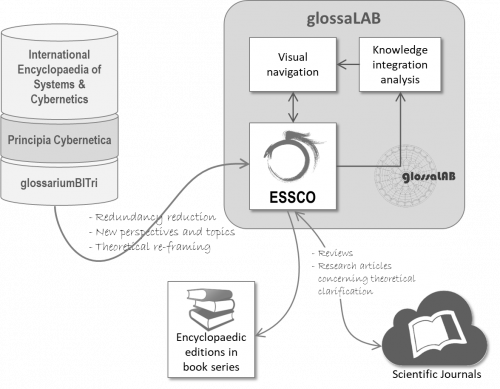Intensional performance
Intensional performance is defined as the capacity of a conceptual system C to refer a knowledge field K. The larger the relation between the extensions of K and C the larger the intentional performance of C.
The relative intensional performance of a set of definitions (re-framed) with respect to an original set is defined as the relation between the number of definitions in the original set with respect to the second, provided that K is preserved.
Thus, the intensional performance is better if a smaller set of definitions captures the same internal content as the original set.
The increase of intensional performance in glossaLAB

In the context of glossaLAB, a metatheory of knowledge systems is addressed as a framework offering guidance to increase performance at the theoretical level. To this end, a formal theory for the analysis and representation of knowledge integration is being developed. [1] [2] Its relevance, applied to the field of systems science was highlighted by Klir: “The comparison of individual conceptual frameworks used in individual approaches to general systems theory appears to be very difficult. A metatheory must be used to decide whether one concept is identical to, is different from, or is a proper subset of a concept drawn from another theory". [3]
Figure 1 illustrates the theoretical undertaking in the passage from the contents of the original corpora into ESSCO. GlossaLAB editorial team is committed to this work, assisted by a scientific council. At the same time, this team is in charge of leveraging the participation of the systems science and information studies communities and the proper integration of the new contributions into ESSCO.
References
- ↑ Burgin, M., Díaz-Nafría, J.M. (2019). Introduction to the mathematical theory of knowledge integration: Conceptual systems and structures. Communications in Computer and Information Science, 1051, pp. 469-482. https://doi.org/10.1007/978-3-030-32475-9_34 [archivable version]
- ↑ Díaz-Nafría, J.M.; Burgin, M.; Rodríguez-Bravo, B. (2019). Knowledge structures and Conceptual Networks for Evaluation of Knowledge Integration. In G. Dodig-Crnkovic, M. Burgin (eds.), Philosophy and Methodology of Information, pp.457-490, Singapore: World Scientific. [archivable version]
- ↑ Klir, G.J. (ed.) (1972). Trend in General Systems Theory. New York: John Wiley & Sons.